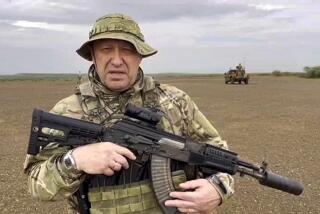An Accountable KGB?
- Share via
Lenin, Stalin, Trotsky and scores of other Russian revolutionaries all spent years in Siberian confinement for their anti-state activities, identified and convicted thanks to the diligence of the czar’s political police. When the Bolsheviks seized power in 1917, they already knew that a large and effective secret police organization is a vital agency of autocratic power. Foremost among the instruments of repression they established was the Cheka, or Extraordinary Commission for Struggle with Counterrevolution and Sabotage. Ever since, under different names--currently, the KGB--the secret police have served as the most ruthlessand feared tool of Communist Party control. Now the first effort is under way to hold the secret police broadly accountable for their domestic behavior.
In yet another of those extraordinary breaks with the past that is becoming almost commonplace as the Soviet Union struggles with political and economic reforms, the new Parliament, the Supreme Soviet, has extracted a pledge from the KGB’s chairman that his organization will become more open and more respectful of the nation’s laws. Vladimir A. Kryuchkov, who was questioned by the parliamentarians for hours before winning confirmation in his job, did not satisfy his toughest critics, like the maverick populist Boris N. Yeltsin,that he was entirely truthful and sincere. But he did appear to accept the principle of full legislative oversight of the KGB’s activities, and he did promise that the KGB would respect the legal rights of Soviet citizens.
Assurances are, of course, easy to give; the test will come with performance. Kryuchkov drew derisive laughter when he denied that the KGB taps telephones or employs more than a few “helpers,” i.e. paid informers. As virtually all Soviet citizens know, the KGB is a huge and pervasive enterprise, one with few scruples about respecting individual rights. If the secret police is no longer the virtual state-within-a-state that it grew into under Stalin, it remains a very well financed and nearly ubiquitous organization with few formal limits on its great inherent powers.
Kryuchkov promises a more law-abiding and responsible agency. In speaking about the “bitter past,” he condemned as a “crime against humanity” the great Stalinist purges of the 1930s, when the secret police tortured and murdered on a vast scale. He even seemed to hint that the KGB’s vast archives might at some point be selectively opened so that historical truth could better be served. These are important reforms. What is more important now is that the Supreme Soviet act to make sure that they are carried out.
More to Read
Sign up for Essential California
The most important California stories and recommendations in your inbox every morning.
You may occasionally receive promotional content from the Los Angeles Times.










